|

|
UK Enables Cameroon’s Abusive Dictatorship
 Print This Print This
By Phil Miller | Declassified UK
from Consortium News
Thursday, Mar 10, 2022
 |
| Cameroonian troops enter an Anglophone town, April 2020. (VOA, Wikimedia Commons) |
British diplomats believe Cameroon, a country with 27
million inhabitants, is run by just five men and that there is
“extensive corruption.”
At the top is President Paul Biya, who
has ruled the central African state with an iron fist for nearly 40
years. Now in his late 80s, he governs mostly from a luxury hotel in
Switzerland.
But Britain supports his regime and conducted six
secret counter-terrorism operations in Cameroon last year, it can be
revealed.
They have code names like Cylix, Bacchus and Abbadide.
Most of the operations involved training and “capacity building” for troops tackling the Boko Haram and Islamic State groups.
This
included U.K. activity at a barracks in Cameroon’s far north, Salak,
where Amnesty International says terrorism suspects were tortured.
Britain is building training villages in Salak for elite Cameroon units, documents obtained by Declassified show.
Those forces are also accused of severe human rights abuses against an English-speaking “Ambazonian” movement.
In
response to fresh demands for autonomy from the Francophone central
government in 2017, Amnesty says more than 20 peaceful protesters were
shot and over 500 arbitrarily detained.
Our revelations of
British support for Biya’s regime come as Amnesty launched a campaign on
Monday to free political prisoners in Cameroon.
Fabien Offner, a researcher for the group, said:
“Over
the past five years, the human rights situation has grown increasingly
bleak as people from Anglophone regions, including journalists, human
rights defenders, activists and supporters of political opposition, have
been arrested and jailed for expressing their opinions or peacefully
protesting.”
The U.K. government is aware of such
abuses. British officials have privately noted Biya’s “frequent
detention of opposition activists and unjustifiably broad use of the
anti-terrorism law.”
But Whitehall is offering considerable
support to Biya’s regime. One recent U.K. operation, codenamed ODYSSEAN,
saw a British special forces officer draft a “crisis management”
doctrine for Cameroon’s president.
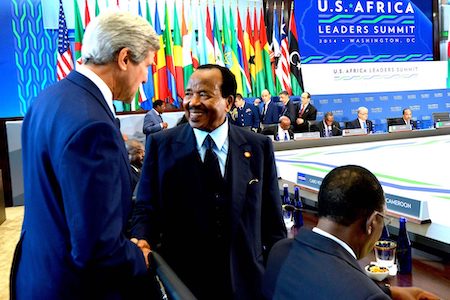 |
| Aug. 6, 2014.: Cameroon’s President Paul Biya, right, with U.S. Secretary of State John Kerry in Washington. (U.S. State Department) |
In return for this and other services, Biya awarded the officer — lieutenant colonel ‘Sid’ Purser — the equivalent of an MBE.
Alongside
the military support, Britain signed a £200 million trade dealwith
Cameroon last year. A British foreign minister met President Biya in
March 2021 to discuss “investment opportunities”, which include a
Guinness factory.
Ngoh Ngoh & Eko Eko
Lt Col Purser — a Falklands war veteran and marine commando — is stationed in Cameroon as Britain’s “senior military adviser.”
There,
he has cultivated “influential relationships” with Biya’s “right hand
man,” Ferdinand Ngoh Ngoh, and Cameroon’s spy chief Leopold Maxine Eko
Eko. Cameroon’s prime minister and defence minister appear to be the
other most influential people.
Ngoh Ngoh came to Britain in May 2018 to visit the U.K. intelligence community.
Eko
Eko runs the country’s fearsome intelligence agency, the Directorate
General Research External (DGRE). British diplomats described him as a
“dove” and said his spies “previously had a bad compliance reputation”
until he took over in 2010.
However, Amnesty International has
published allegations of torture throughout Eko Eko’s leadership of the
DGRE. Former detainees say senior DGRE officers got away with torture
from 2013-17.
Despite Amnesty’s detailed report, U.K. Defence
Minister James Heappey met Eko Eko at a dinner hosted by the British
ambassador while visiting Cameroon last spring. The British minister was
briefed to “reinforce the view that protecting the civilian population
is paramount.”
He was also advised to “praise” Eko Eko for his
counter-extremism efforts and “thank” him for letting British troops
conduct “capacity building” of the DGRE at Salak, which is “close to the
area of operations.” The spy chief deployed 32 of his men at the
notorious torture site to coincide with the U.K. training.
Ministerial Visit
Ministry
of Defence (MOD) briefing papers for Heappey’s visit have been obtained
by Declassified. They expose the scale of Britain’s covert military
role in the African police-state — where France is traditionally seen
as the more dominant European power.
The documents show how
British diplomats overlook Biya’s “shortcomings on human rights and
democracy,” partly because he voted with the U.K. to condemn the use of
chemical weapons by Russia and Syria.
The U.K. saw Cameroon as a “priority lobbying country” at the Organisation for the Prohibition of Chemical Weapons (OPCW).
“President
Biya is instinctively a supporter of the rules-based international
order,” the then UK High Commissioner Rowan Laxton insisted.
A
few months later, more than 500 activists from the opposition party, the
Movement for the Renaissance of Cameroon, were reportedly rounded up.
The
crackdown earned Biya criticism from 14 U.N. human rights experts, who
were “extremely worried about mass arrests of peaceful protesters and
political activists who express dissent.” More than 100 activists from
this group remain in detention, Amnesty said on Monday.
Rapid Intervention Battalion
As
well as supporting Cameroon’s intelligence agency, Britain works with
the regime’s special forces. “The main focus of UK capacity building in
Cameroon” is on the Bataillon d’Intervention Rapide (BIR), or Rapid
Intervention Battalion, the documents show.
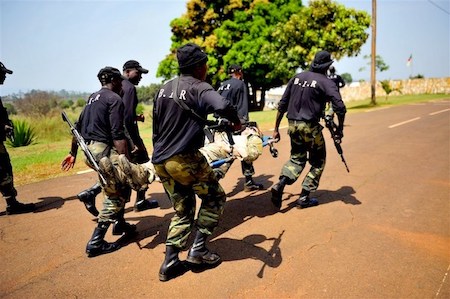 |
| Bataillon d’Intervention Rapide soldiers in 2013 training in Bamenda, Cameroon. (U.S. Air Force, Larry W. Carpenter Jr.) |
This
is a well-armed elite force of 10,000 men. They are accused of torture,
executing women and children, and burning down a village. French, U.S.
and Israeli support for the BIR is well known, whereas Britain’s role
has remained largely hidden.
Minister Heappey was photographed on
Twitter with the BIR during his visit to Cameroon last year. The MOD’s
tweet said British troops were “working alongside Cameroon’s BIR force
to counter the twin threats of Islamic State and Boko Haram in the Lake
Chad Basin.”
His briefing notes reveal much more about the extent
of this deployment. They show Heappey met Colonel Ndongo, the BIR
commander of what the Biya regime calls Operation Alpha — its mission
against Boko Haram.
Heappey was told to congratulate the colonel
on his “successful” work against the terror group and ask what more the
U.K. could do. The British minister then observed U.K. troops providing
capacity building in Salak, where detainees have allegedly been
tortured.
A British army short-term training team was deployed to
Salak from January 2021. There they conducted “train and advise
activity with BIR and DGRE” until around mid-April 2021.
By that
stage, Whitehall was considering “whether the capacity building should
evolve to include assist, enable or accompany functions.” It is not
clear if this development went ahead.
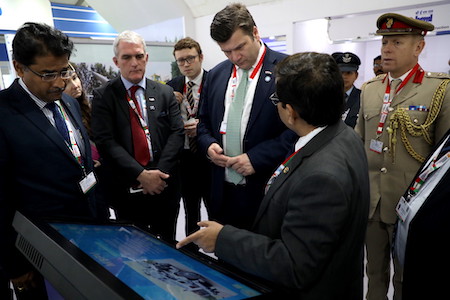 |
|
James Heappey, third from right, at a weapons expo in early 2020, while serving as U.K. minister for defence procurement. (British High Commission, New Delhi, Flickr) |
A U.K.
brigadier general who visited Cameroon during the deployment “noted the
professionalism” of the BIR and DGRE but worried their successes were
“generally short lived.”
Britain’s former ambassador believed Cameroon security forces “have performed admirably.”
U.K.
interest in Cameroon grew after neighboring Nigeria snubbed some MOD
offers to help counter Boko Haram. The militant group has kidnapped
school girls and terrorizes the Lake Chad region.
France asked the U.K. to “do more” to counter the Islamic extremist group in 2016. The then Prime Minister Theresa May agreed.
Purser’s
military post in Cameroon was established and he focused “on delivering
effect in North East Nigeria from the ‘outside-in.’ ”
He had spent the previous five years leading counter terrorism efforts by U.K. special forces across north west Africa.
His more recent work in Cameroon has relied on troops from 1 Scots Specialised Infantry Group.
These
soldiers are now part of the army’s special operations brigade, a new
“ranger battalion” that is expected to fight alongside allies in
counter-insurgency situations.
This concept has already been
trialed in Cameroon, where an “exchange of notes … provides for U.K.
jurisdiction and carriage of weapons in the far north.”
It also
sets out Britain’s human rights concerns and “what our response would be
to any infraction.” The files say “this is closely monitored.”
The
risk is so high that U.K. training “has been designed to be delivered
directly to force elements that are already deployed or will deploy
shortly” on operations to counter Boko Haram or Islamic State in
northern Cameroon.
This is “intended to minimise the risk of UK
trained units being diverted to other theatres,” a reference to parts of
the country where English-speakers are struggling for independence.
Training
includes “mountain manoeuvre” and “targeted use of intelligence (to
reduce collateral damage)”. The MOD claims the training has made
Cameroon’s state security forces “highly effective”. The Red Cross
provides sessions on the law of war as part of the training.
Private Security Companies
Air
support for ground troops appears to be an issue. All three of
Cameroon’s C130 military transport planes were grounded in March 2021.
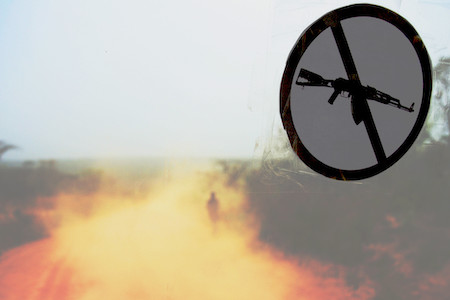 |
| Inside the windshield of an aid vehicle moving through a conflict zone in Cameroon in 2009. (U.K. DFID / Simon Davis) |
Marshall
Aerospace, a British firm, signed a contract in 2019 to maintain the
aircraft but it is awaiting payment from Cameroon’s state oil company.
Heappey was instructed to ask Biya’s right-hand man, Ngoh Ngoh, to “unlock the bureaucracy” and let the payment go through.
Another
British business, the Westminster-based Torchlight Group, has provided
intelligence analyst training to “all force elements engaged in the far
north” of Cameroon.
It helped “provide interoperability between
all agencies” such as DGRE and the BIR over the last three years.
Torchlight did not respond to a request for comment.
Ambazonia
The
papers provide a rare insight into the Foreign Office’s view of the
Ambazonia conflict. The region was once a British colony called the
Southern Cameroons. During independence negotiations in 1961 local
people voted to join the larger, French-speaking part of Cameroon.
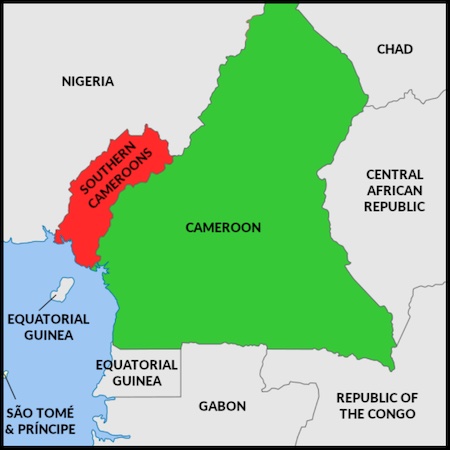 |
| Map of Cameroon with territory claimed by Ambazonia in red. (Mikrobolgeovn, CC BY-SA 4.0, Wikimedia Commons) |
A
federal system that was meant to preserve some autonomy gradually broke
down, and this marginalization fueled Ambazonian separatist sentiment.
The
documents show British diplomats noting that “widespread human rights
abuses continue to occur at the hands of both separatists and state
security forces” in Ambazonia.
Whitehall believes:
“There
is no chance of — and little popular support for — independence … But
the conflict will continue to simmer unless and until the Government
addresses the reasonable demands of the moderate majority.”
These
“moderate” demands are seen as greater autonomy, financial support,
protection of civilians and respect for the use of English.
U.K.
officials think Biya had “a long period of denial” on the Anglophone
crisis and that his defence minister, Joseph Beti Assomo, believes it
can be “ended through military action alone.”
At Heappey’s meeting with Ngoh Ngoh, who is also Biya’s likely successor, he was told to point out:
“There
still appears to be too many allegations relating to the Anglophone
crisis, notwithstanding the possibility of disinformation [fake news],
all credible allegations must be investigated.”
An
initial “dialogue plan” for the crisis was “developed in coordination
with Sir Jeffrey Donaldson”, a right-wing MP in Northern Ireland.
Donaldson
walked out on the Good Friday Agreement peace talks but has styled
himself as an international conflict negotiation expert. He is now U.K.
trade envoy to Cameroon.
Heappey was advised to tell Cameroon’s
spy chief, Eko Eko, that “military operations must be intelligence led
and precise and that dialogue is essential to achieving a peaceful
solution to the conflict.”
He was to “highlight our own
examples/lessons from Northern Ireland where the UK did not always get
it right” such as internment — the mass detention of terrorist suspects
without trial.
An MOD spokesperson told Declassified:
“The UK is committed to working with regional allies in Central and West Africa to tackle violence in the Lake Chad Basin.
“Cameroon
is an important partner in this effort and we are exploring what
further support we can provide to tackle shared security challenges and
further contain the spread of violent extremism in the region.”
The Cameroonian authorities did not respond to a request for comment.
Source URL
|
 Print This Print This

|
If you appreciated this article, please consider making a donation to Axis of Logic.
We do not use commercial advertising or corporate funding. We depend solely upon you,
the reader, to continue providing quality news and opinion on world affairs. Donate here
|
 |
World News

|

